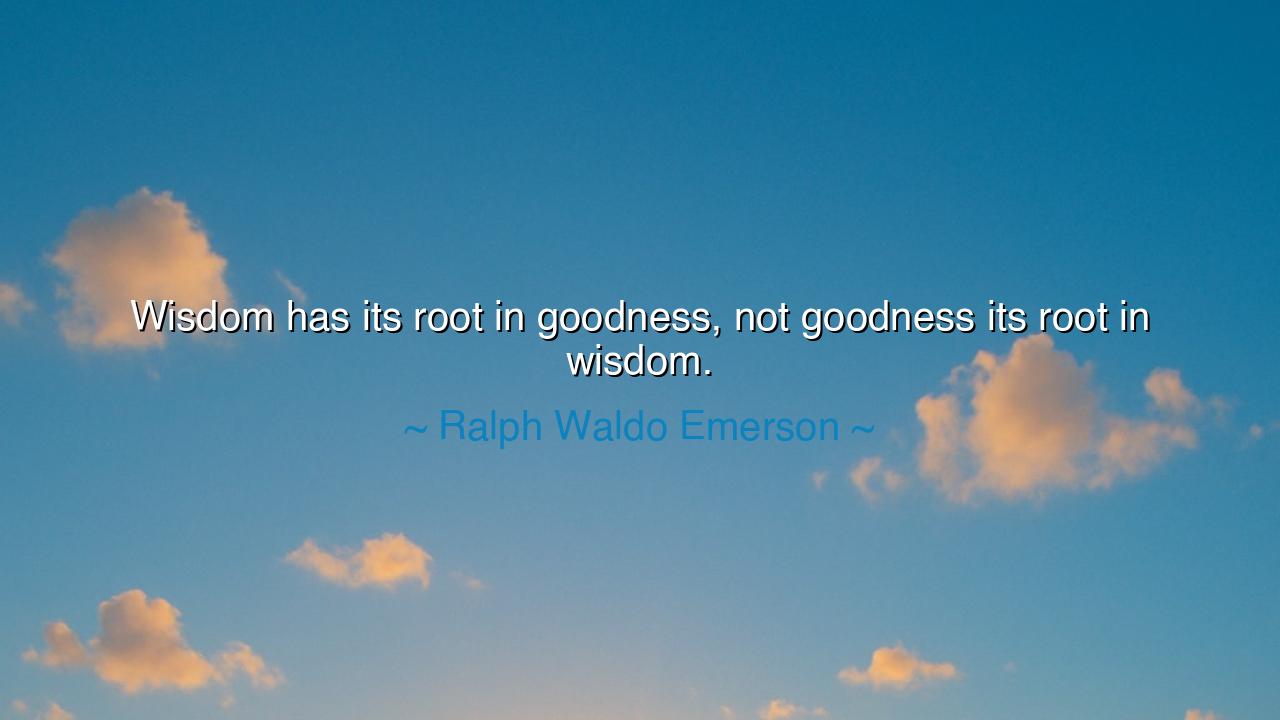
Wisdom has its root in goodness, not goodness its root in






Ralph Waldo Emerson, sage of Concord and herald of the inner life, declares: “Wisdom has its root in goodness, not goodness its root in wisdom.” In this profound reversal, he reminds us that wisdom does not give birth to virtue; rather, goodness is the soil from which wisdom grows. The intellect may dazzle with cleverness, but without a foundation in moral truth, it becomes a barren flame. True wisdom is not cunning, not calculation, but the fruit of a heart grounded in what is just, merciful, and good.
The ancients testified to this law. Plato spoke of the tripartite soul, and he placed justice and harmony as the foundation of the well-ordered life. Without goodness, knowledge becomes corrupted, and the wise man degenerates into a sophist. Emerson’s words echo this: the mind, if severed from the root of virtue, may achieve brilliance, but never wisdom. Only when knowledge is nourished by goodness does it flower into something enduring and life-giving.
History bears witness in the rise and fall of leaders. Marcus Aurelius, emperor of Rome, was schooled in philosophy and wielded immense power. Yet what made him wise was not his learning alone, but his goodness, his devotion to justice and humility amidst the temptations of rule. In contrast, Machiavelli’s prince, though cunning, shows us a mind without goodness: clever, perhaps, but not wise. Such a man may win battles, but he loses the soul of his people.
This teaching also shines in the life of Mahatma Gandhi. His strategies of nonviolent resistance were not the product of intellectual brilliance alone, but of profound goodness—a soul rooted in compassion and truth. From that root sprang wisdom that reshaped a nation. Had he sought only cleverness, his movement would have collapsed; but because his wisdom was born of goodness, it had power to endure and inspire generations.
Let the generations remember: do not seek wisdom as a treasure apart from virtue. Knowledge without goodness is dangerous; power without virtue is ruin. But when a man roots himself in goodness, wisdom comes as the natural fruit, as the tree blossoms from fertile earth. Thus Emerson teaches us the order of the soul: first be good, and then you will be wise—for wisdom without goodness is not wisdom at all, but only a shadow wearing its name.






DVdam van
This quote prompts consideration of the hierarchy between ethics and knowledge. Does emphasizing goodness as the root of wisdom imply that moral cultivation should precede intellectual development? I also question how this perspective applies in professional or academic contexts—can brilliance alone lead to positive outcomes if divorced from ethical grounding? It encourages reflection on how personal character not only guides behavior but also shapes the quality and application of one’s insight and judgment.
VNPham Van Nga
I feel reflective reading this quote, as it raises questions about the source and purpose of wisdom. Can wisdom emerge from flawed motives, or does it require an underlying commitment to what is right? I also wonder whether this principle applies universally across cultures or is contextually influenced. The quote inspires me to examine my own actions and motivations, asking whether I prioritize goodness in ways that could foster genuine understanding and discernment.
TTVu Thu Trang
This statement sparks curiosity about the relationship between morality and intellectual achievement. Is Emerson suggesting that acts of goodness inherently foster wisdom, or that moral character creates a mindset conducive to discernment? I also question whether society often inverts this idea, valuing cleverness or strategic thinking over ethical integrity. The quote challenges me to consider how cultivating virtue in daily life can be a more reliable path to meaningful insight than mere accumulation of knowledge.
NHsiu nhan hack
Reading this, I’m struck by the ethical priority Emerson places on goodness over intellect. It makes me wonder if wisdom without a moral foundation is truly valuable or merely cleverness. Can knowledge be fully effective if divorced from ethical principles? This quote encourages reflection on how personal virtue shapes judgment, decision-making, and influence, suggesting that cultivating goodness may naturally lead to the development of deeper understanding and insight.